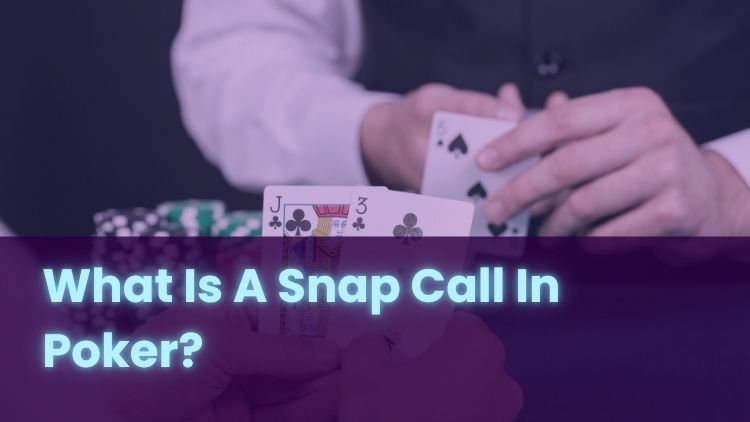
Poker is a game that blends strategy, observation, and quick thinking—and understanding its terminology can deepen your understanding of what’s going on at the table. One term you may hear is "snap call," often used in fast-paced moments of play.
But what does it actually mean, and when might a player make one?
In this article, we'll break down what a snap call is and how it fits into poker strategy. Whether you're just starting out or looking to fine-tune your skills, getting familiar with terms like this can help you make more informed decisions.
What Does a Snap Call Mean In Poker?
In poker, a "snap call" is when a player instantly calls a bet without hesitation. It’s usually a sign of confidence—either because the player believes they have a strong hand or they had already made up their mind about what to do before the bet was even placed.
This quick reaction can serve more than one purpose. Strategically, it might be used to show strength or maintain a consistent playing rhythm. Psychologically, it may also put pressure on opponents, potentially making them second-guess their own decisions.
While a snap call might seem impulsive, it often reflects a well-considered plan based on earlier moves in the hand. Like all decisions in poker, it’s important that it fits within a thoughtful strategy and is made responsibly.
How To Make a Snap Call In Poker?
A snap call in poker is all about speed and certainty. It happens when a player quickly calls a bet without hesitation—usually because they’ve already made up their mind based on their hand or the flow of the game.
To make a snap call, a player is typically confident in their cards or has a clear strategy in place. This instant reaction may also be a psychological play, sending a message of strength to other players. Sometimes, it’s genuine; other times, it might be part of a bluff designed to unsettle opponents.
Reading and understanding snap calls may also offer useful insight into how others at the table are thinking. If someone calls immediately, it may reveal something about their hand—or about how they want their opponents to perceive it.
As with any poker tactic, snap calls should be used with intention. They work best when they’re part of a thoughtful approach to the game. Always play within your limits and keep your decisions grounded in responsible strategy.
When To Make a Snap Call In Poker?
Knowing when to make a snap call in poker may influence the outcome of a hand—and sometimes even the overall game.
One of the most common reasons for a player to make a snap call is when they’re holding a very strong hand, such as a full house or a flush. In these cases, there's little need to think it over—they’re happy to call and want to show it. It may also serve as a psychological move, sending a message of strength to their opponent.
Another instance where a player might decide to make a snap call is when they’ve read the situation well and believe their opponent is bluffing. Calling instantly may disrupt their momentum and potentially lead them to make further mistakes.
Snap calls can also fit into a pre-planned strategy. If the hand is playing out the way the player expected, a quick call may help keep their approach consistent and confident.
That said, it's important not to overuse snap calls. If a player makes them too often, it may give away patterns in their play, which experienced opponents may pick up on.
Ultimately, snap calls—like all decisions in poker—should be made with care and within the context of a broader strategy. Make sure to keep your play responsible and stay within your limits.
**The information provided in this blog is intended for educational purposes and should not be construed as betting advice or a guarantee of success. Always gamble responsibly.
